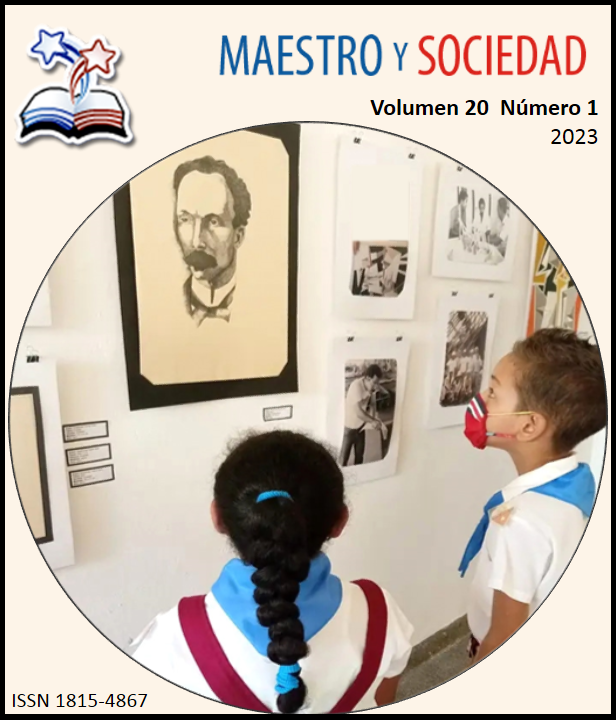Didactic Strategy for learning how science works, from the Introduction to Physics Propedeutic Course
Didactic Strategy for learning how science works, from the Introduction to Physics Propedeutic Course
Keywords:
Physics education, 01.40.-d, Teaching methods, 01.40.gb, Physics careers, 01.85 f t, Science in school, 01.40.E.Abstract
Introduction: This work presents the didactic strategy to optimize the teaching-learning process of this Introduction to Physics Propedeutic Course of the first year of the Physics Degree.
Materials and methods: Through a historical-logical analysis of the concepts applied in the teaching of Physics according to the reviewed bibliography, we worked with first-year students of the Physics Degree from the Universidad de Oriente, specifically, in the Propedeutic Course. "Introduction to Physics".
Results: The proposal tends to eliminate the emphasis on the memorization and mechanical use of the equations, usual in secondary education, and to emphasize the methods and ways of acquiring scientific knowledge that, due to its methodological nature, allows organizing the subject and establishing didactic strategies. more in line with the method of Physics.
Discussion: The teaching of science must involve its own nature and take the form of scientific research since the teaching of Physical Sciences in general is reduced to the presentation of knowledge already elaborated and students are not given the opportunity to know the activities characteristic of scientific work.
Conclusions: This strategy should allow changing the preconceptions and work methods of the students, making them feel "discoverers"; allow them to understand more fully the new concepts and the need for generalization of others.
References
Alamino Ortega, D. J., Aguilar Rodríguez, Y. (2018). Hacia una enseñanza de la Física apegada a sus fundamentos. Rev. Cub. Fis., 35(1).
Bravo, B. et al., (2010). Los modelos de la ciencia para explicar la visión y el color: Las complejidades asociadas a su aprendizaje. Enseñanza de las Ciencias, (28), 113 -126.
Brookes, D. T., Etkina, E. (2009). "Force," ontology, and language, Phys. Rev. ST Phys. Educ. Res. 5 0101110.
Cachapuz, A. et al. (2005). A necessária renovação do ensino das ciências. Ed. Cortez.
Candela, M. (1991). Rev. Mex. Fis. 37(3), 512.
Kang, N.-H., Wallace, C., (2004). Secondary Science Teachers´ Use of Laboratory Activities: Linking Epistemological Beliefs, Goals, and Practices. Science Teacher Education, 89, 140-165.
Landa L. y Morales C. (2019). Alternativa metodológica para el uso del método científico experimental en las clases de laboratorio de Física. Rev. Cub. Fis., 36(1), 77.
Méndez Pérez, L. M. (2016). Una presentación histórica e inductiva alternativa del curso de Mecánica. VII Taller Iberoamericano de Enseñanza de la Física Universitaria. http://tibero.uh.cu/
Méndez Pérez, L. M., et al. (2014). Estrategias didácticas para optimizar el proceso de enseñanza-aprendizaje de la Física en el grado 12 de la Universidad de Oriente e incrementar la motivación hacia la profesión. XIII Simposio y XI Congreso Sociedad Cubana de Física.
Méndez Pérez, L. M., Martínez Sánchez, F. R. (2022). Curso propedéutico de Física para estudiantes de nuevo ingreso a la Licenciatura en Física. VII Taller de Enseñanza de la Física.
Méndez Pérez, L. M., Martínez Sánchez, N., González Martínez, R. (1997). Diseño de un curso de Introducción a la Física General: concebido hacia un cambio conceptual. I Taller Iberoamericano de Enseñanza de la Física Universitaria.
Mes. (1990). Plan de estudio "C". Licenciatura en Física. Comisión Nacional de la Carrera de Física. Ministerio de Educación Superior.
Moreira, M. A. (2021). Predisposición para un aprendizaje significativo de la física intencionalidad, motivación, interés, autoeficacia, autorregulación y aprendizaje personalizado. Rev. Ens. Fis., 33(1), 141- 146.
Downloads
Published
How to Cite
Issue
Section
License
Copyright (c) 2023 Luis Manuel Méndez Pérez, Francisco Rafael Martínez-Sánchez, Lidia de las Mercedes Ferrer Tellez, Idelisa Bergues Cabrales

This work is licensed under a Creative Commons Attribution-NonCommercial-NoDerivatives 4.0 International License.
This journal provides immediate open access to its content, based on the principle that offering the public free access to research helps a greater global exchange of knowledge. Each author is responsible for the content of each of their articles.



























 Universidad de Oriente
Universidad de Oriente 